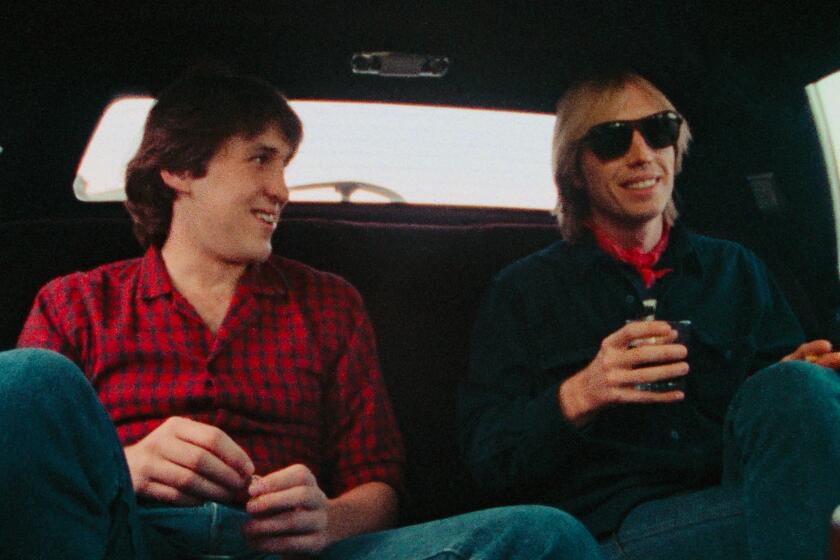Directors Roundtable: Six filmmakers talk shop
Directors Roundtable

Filmmakers Ben Affleck, Kathryn Bigelow, Ang Lee, David O. Russell, Sacha Gervasi and Tom Hooper discuss working with actors, making it personal for the crew and more with Los Angeles Times staff writer John Horn. Read the full story below.
Video: Epix and Los Angeles Times Staff. Photography: Jay L. Clendenin / Los Angeles Times. Design: Lily Mihalik and Stephanie Ferrell. Interactivity: Armand Emamdjomeh.
By John Horn
Their stories are as dramatically different as their personalities, but the six filmmakers — Ben Affleck, Kathryn Bigelow, Sacha Gervasi, Tom Hooper, Ang Lee and David O. Russell — who came together for the fourth annual Envelope Directors Roundtable are united by a passion for distinct storytelling anchored by a love of actors.
All of the directors faced unusual production challenges — Lee's "Life of Pi" was shot in a giant water tank, and Hooper's "Les Misérables" employed live singing — and each movie suffered more than a few setbacks. But now that their films are finished and being warmly welcomed, the directors looked back to celebrate the happy accidents that shaped their movies and laughed about the bad days that threatened to undermine their work.
While so much has been written about Hollywood's obsession with managing risk and focusing its resources on lowbrow superhero tales, all six directors were able to make sophisticated adult dramas that hardly fit in any obvious genre.
PHOTOS: Behind the scenes at the Directors Round Table
Lee's film is a 3-D drama about a boy on a lifeboat with wild animals, Hooper's an adaptation of an operatic musical, Bigelow's "Zero Dark Thirty" an inside look at military intelligence, Affleck's "Argo" a period mash-up of action and comedy, Russell's "Silver Linings Playbook" a love story about two people with mental or emotional issues, and Gervasi's "Hitchcock" a look at the personal and professional struggles of the famous director.
Somewhat fittingly, it was the outlier status of their projects that sparked the directors' interest — none of these filmmakers are comfortable playing it safe.
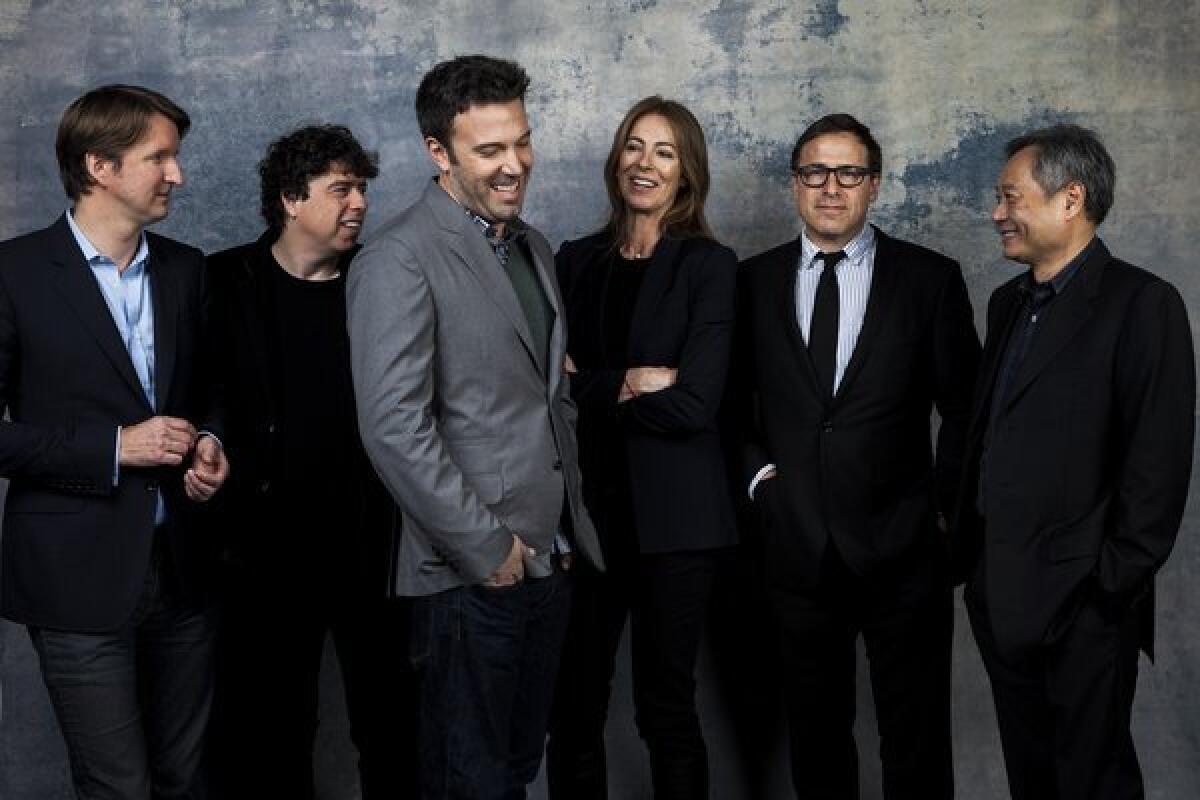
Tom Hooper ("Les Miserables"), left, Sacha Gervasi ("Hitchcock"), Ben Affleck ("Argo"), Kathryn Bigelow ("Zero Dark Thirty"), David O. Russell ("Silver Linings Playbook") and Ang Lee ("Life of Pi") pose before joining the L.A. Times Directors Roundtable. Click on the photo above to see the full gallery. Photo by Jay L. Clendenin / Los Angeles Times.
Here are edited excerpts from the conversation:
Is part of what attracts you to the movies you made that it was scary?
Ang Lee: Absolutely. I think being scared, fear, is our strongest emotion. Not even love. Fear is the No. 1 thing that tends to make us do the best thing. I don't think we're looking for the fall, but we just want to go to that edge. I want to feel like every movie I do, I'm like a virgin, doing it for the first time. It's getting harder and harder as we get older and more experienced.
Tom Hooper: I felt when I was being drawn to "Les Misérables," I was being drawn like a moth to a flame because I knew the possibility, the problem of getting severely burned was quite high. But when I first saw the musical just over two years ago, because I wasn't someone who saw it when I was a kid, I was as overwhelmed by the difficulty of doing it as its possibility. And that sense of taking a risk was, I found, incredibly exciting, not just for me but the entire team.
Ben Affleck: Fear is the strongest of drivers. If you're being chased by a bear, you run faster than when you're going to your girlfriend's house. This movie was a real challenge because there were these different tones. It had a much bigger scope. It had this resonance of geopolitics today, our relationship to Iran, as well as having this theme of storytelling that was kind of universal and important to me. And they all seemed so disparate. It was quite frightening.
Sacha Gervasi: Well, obviously I was terrified. Having just directed this documentary "Anvil," so it was a completely new skill set. For me it was a story I didn't know, which was really the story of a marriage and a relationship, which was the unexpected story. In the lead-up to getting a film made, there's so much momentum — will it happen, will it not happen? And then finally you get this moment where it's happening. The terror really hit me when I was in the rehearsal room and it was just me and Anthony Hopkins and Helen Mirren. He looked at me, like, now what?
David O. Russell: You can be more scared than [your actors] are, but you always have to be the one who's saying, "This is going to be fine, we know exactly what we're doing," even though inside, you might have just been saying to your producer, "What is going to happen in this scene? I have no idea — help me."
Kathryn Bigelow: The excitement for me was the challenge to capture a moment in time that would stand the test of time. And the piece was kind of unfolding while it was being written, while we were shooting. So this kind of contemporaneous quality to it was kind of exciting, galvanizing and challenging at the same time.
PHOTOS: Celebrities by the Times
When you're thinking about what movie you're going to direct next, is there any kind of tactical thinking, is this a movie I can get somebody to finance, that audiences may want to see? How it fits into your body of work?
Affleck: First of all, there aren't enough screenplays. Second of all, I'm not visionary enough. To me it's about something comes along and hits you … all of a sudden you get that script and you go, "That's it."
Hooper: I certainly feel, coming off "The King's Speech," that I didn't want to try to repeat that or make another story from the same place inside myself.
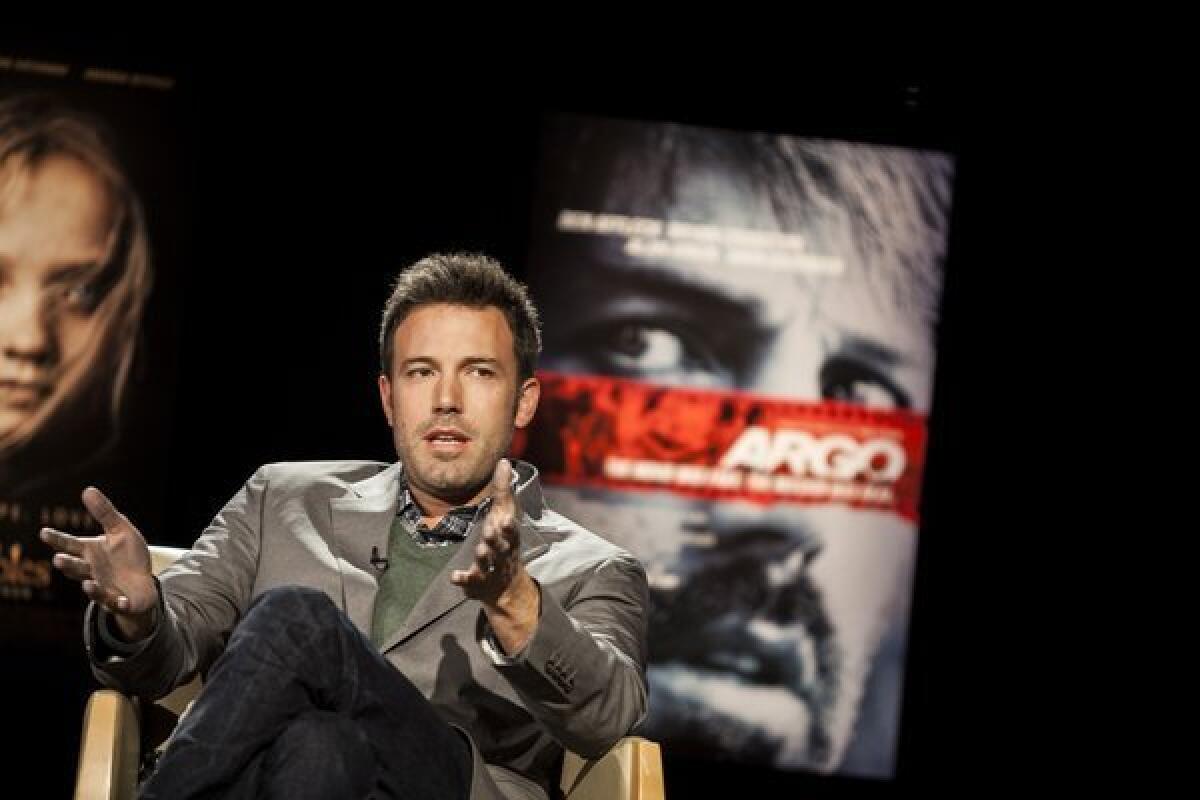
'Argo' director Ben Affleck. Click on the photo above to see the full gallery. Photo by Jay L. Clendenin / Los Angeles Times.
Russell: The story that I was doing was a personal story that I was inspired by. I had been looking for a story that would make my son feel part of the world. And when the book came to me five years ago, I said, "This is that story."
Lee: I want to try anything, I want to touch my hands on as much as possible. In the beginning I had to struggle for that, I had to prove that I could do it. I think after "Crouching Tiger, Hidden Dragon" it seems like there's an internal silver lining, one movie sort of leads to the next. So the next thing will make me jump onto the next and just waiting for whatever hits me.
Bigelow: There's obviously a commonality between "Hurt Locker" and "Zero Dark" to a certain extent. What's interesting to me is a look into the intelligence community, and the women and the men, the professionals who have dedicated their lives, some of who've given their lives, for our safety. We know nothing about what they're doing. So I guess it comes from a kind of curiosity and a tremendous sense of respect and responsibility.
Gervasi: "Hitchcock" is partially about an aging artist, who sort of is willing to risk everything to just reinvent himself. He wants to shock his audience, but he also wants to wake himself up because he's feeling kind of imprisoned by this success. I think that the spirit of that film is something that I'd love to be able to embrace as I move forward. It's obviously very early for me. But "Anvil" and "Hitchcock" are both about marriages, they're both about creative collaborations of sorts. I love the idea of challenging yourself and being in an unsafe area so that you're not doing something familiar. Because I think when you're sort of on the edge, as Ang says, there's the possibility to draw something deeper out of you and propel yourself into new terrain.
VIDEO: The Envelope Screening Series
What are the most awkward conversations you have to have with actors? And are there different strategies for different kinds of actors?
Affleck: I think as an actor you want two things: You want to feel the director believes in you, supports you. And you want the director to tell you the truth. And "support" means different things to different people. Some people, like Morgan Freeman, "support" means, like, "One more take and I'm going to go home." The problems I've had, I've always just gone and said, "It's not working for me. I just don't see it." And people tend to get sort of relieved and go, "OK. We'll try something else." Because as an actor, you just don't know. People go "Great, great." And they never call you back. [So] just treating somebody with the decency of honesty and directness, I think is actually what you can ask for.
It's a little different for you, Ang, because you have a first-time actor in Suraj Sharma.
Lee: That was easy. There's a genuineness, there's innocence. He's a truly incredible talent. So it's about conditioning him into Pi himself. I did have in my earlier career, when I'd speak Pidgin English, particularly on "Sense and Sensibility," that was really hard. There's some very, very awkward moments. I'll say something in English but with Chinese grammar. They're confused.
Russell: The word "vibe" is very important. And if people get it, it's like a song, and any director here is singing that song, and everybody dials into it. If you have 10 actors in a scene, they should all feel the song, and they're all different instruments in that scene. Sometimes great direction is just no nonsense — just stop acting. I'll even say that, "No acting, just cut the crap." And sometimes that's very liberating to an actor.
Affleck: The one thing I say the most, all the time, is just stop, don't do anything. Because the actors sometimes feel this onus to come and perform. And paradoxically [with] a great salesman, you don't realize is selling you something. I tell them it's not your job to make the movie. It's my job.
Russell: Robert De Niro's a great teacher of that. And he was like a godfather, no pun intended, on our set, because he showed up emotionally. He was very personally invested.
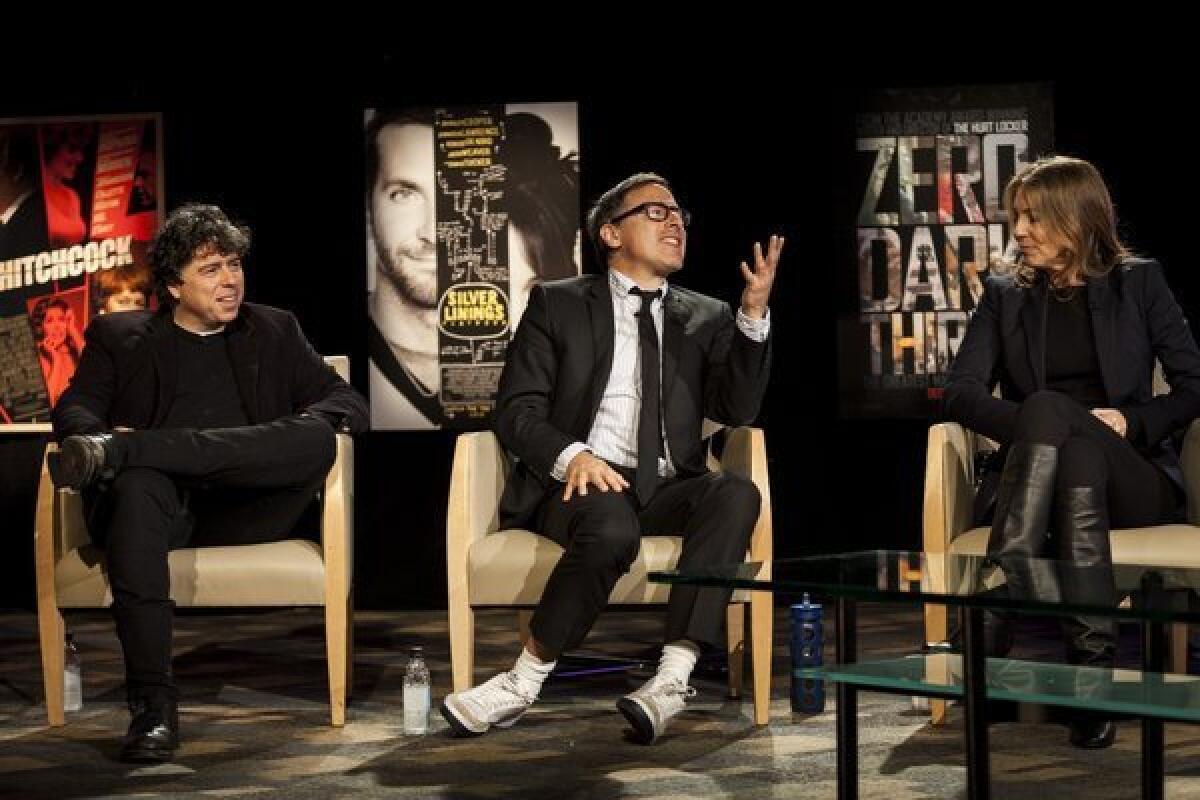
Sacha Gervasi, left, David O. Russell and Kathryn Bigelow. Click on the photo above to see the full gallery. Photo by Jay L. Clendenin / Los Angeles Times.
What do you learn from great actors?
Hooper: Russell [Crowe] said my primary responsibility is to try to establish why this man I'm playing commits suicide. He had this brilliant idea, that in the battle scene there's this little kid called Gavroche who has been killed. And he takes the medal off his own jacket and pins it on the chest of this little boy. And it's this brilliant moment, which makes a lot of people cry, because he knew that he could have stopped the death of a child. And Russell saw that as an opportunity to start the process of unhinging, which leads to his descent.
Gervasi: Tony Hopkins, after 16 hours of shooting, and he's in a fat suit and makeup, wanted to go home. And on more than one occasion, I would say, "Tony, can we just do one more?" And he was like, "No, I'm going home." And then, "One more?" And so we'd do one more take, and for whatever reason it wouldn't be there. And Helen Mirren would then just come up to Tony and go, "Oh, darling, I screwed that up. I was meant to be standing here. Can you just give me one more?" And Tony would go, "Of course, Helen."
Lee: You really have to pay attention to those good actors, when they're inside of a role. They teach you a lot. Because their instinct, where they're going, whether the scene works or not, they may be nice by not even telling you. But if something's not working, you better pay attention …
Bigelow: [There's] so much I discover in the casting process, and I try to spend time there, and realize that there's something in that person that's a quality that's also in the character, so there's a symmetry that I know I can find, or they can find. I have such reverence for actors. I think it's magic what they do.
Lee: And you have to respect that, you have to be humble.
Is there a mathematical percentage you can put to how important casting is of all the decisions you make in making a movie?
Affleck: A hundred percent. You've kind of made your movie once you've cast it. More or less, there are little ways to move the needle, but it's sort of going to go where it's going to go now.
How do you recover when you don't get your shots, when there's a technical problem, when something doesn't come together?
Affleck: It's a job full of frustrations, because it's the intersection between logistics and math and something soft and organic, which is the art of what you're doing. Sometimes it can be really big, like I failed this, I completely … that scene up, I was wrong about it. But I often remember that the worst day of directing is better than the best days I've had doing so many other things.
Hooper: The strangest thing about directing is [that] one of the most dominant narratives of making it is how you manage your lack of time. And that story you render invisible, so by the time the audience sees it, they have no idea that your major drama was actually how to get it done.
Affleck: You watch the movie thinking, "God, it was so cold that day." All you wanted to do is get inside, but it's like the least relevant thing in the world.
Hooper: You can't say to the audience, "Oh, I only had 35 days."
Gervasi: They don't care. The worst time I had was shooting the end of the movie outdoors in downtown L.A. at night, the final scene between Helen Mirren and Anthony Hopkins. And there was this homeless guy who just kept shouting, "What's up, Hannibal?," you know, as in Hannibal Lecter. He was just screaming through the take. So we said politely, "Would you mind? We're trying to make a film." In the end, we just bought him some booze.
Russell: The hardest days for me were when we were outside the [Philadelphia] Eagles game with hundreds of extras, many of them real Eagles fans tailgating.
Affleck: It's the worst risk you can take. You take a movie company into a parking lot of drunk football fans!
Russell: And then getting these intense emotional moments in the middle of all this. You really have to work very hard. That was probably one of my least favorite days.
Do you end up making the movie that you think you're going to make?
Lee: It's marathon. It's dashing in marathons. You have like a year to correct your mistake if you make any mistake. It's a long process, of course. Discover the movie along the way.
Affleck: This is a weird story, but a friend of mine said you should come to this horse therapy. And I was like, what is horse therapy? And you walk this horse around a circle with a rope, and you go up and touch them. But if you tell the horse, if you kind of pull on them, if you were sort of insistent, the horse will stand there. It won't go with you. But if you sort of be calm, be sure of yourself … and then you start to walk, and the horse starts to walk, you know? And it was amazing to me, and it reminded me of all the really sort of great actors and great technicians I've worked with, where you have to sort of approach them, put your hand on them, and they're always looking, ears going back and forth to see, "Are you going to hurt me? Are you good?"
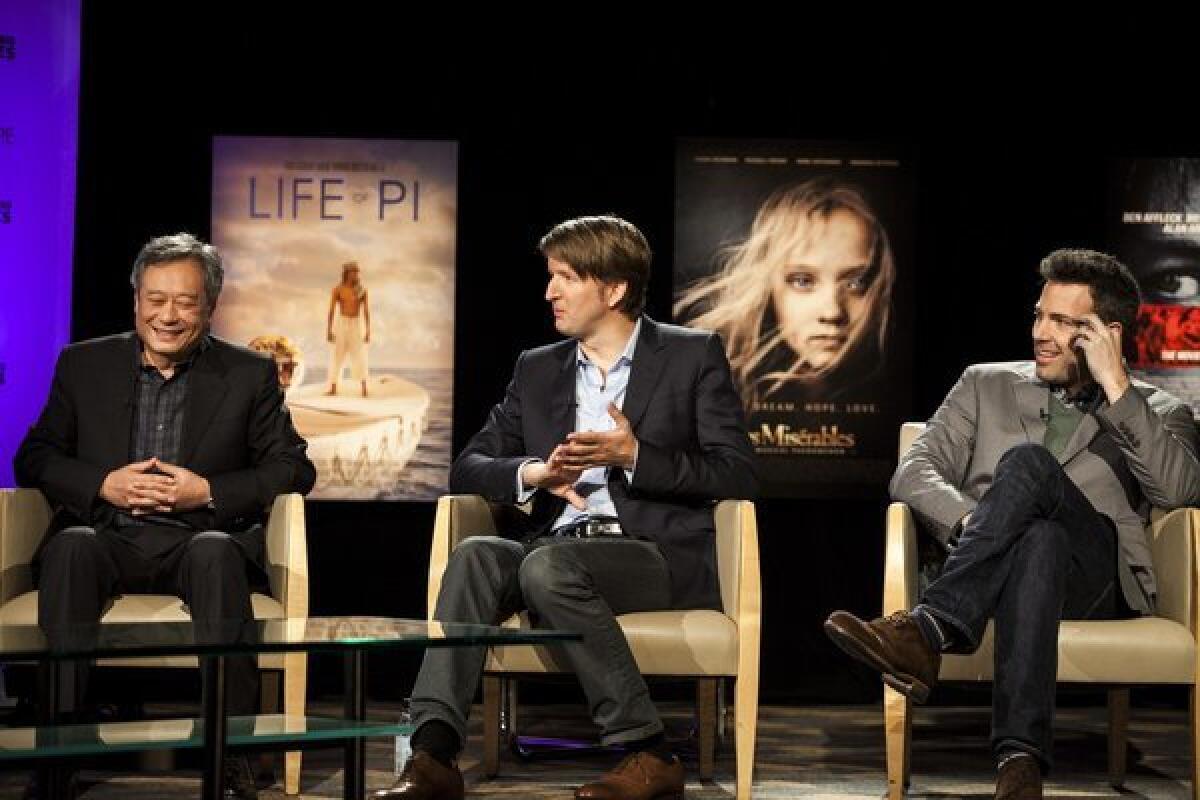
Ang Lee, left, Tom Hooper and Ben Affleck. Click on the photo above to see the full gallery. Photo by Jay L. Clendenin / Los Angeles Times.
It's about how you get people to lead without making it feel you're their commander, right?
Russell: It's imperative for me to tell everybody that this is personal, it means a lot to me. You have to impart how much it means to you in a personal way, which will bring everybody into it, and get you closer to working with that horse, whether that's a Steadicam operator or an actor. That's the thing I'm most proud of. You know, ironically given how you can get tagged, exaggerated from one or two past incidents, is that I'm most proud of being in sync and feeling like a family with the crew …and having everybody being willing to go through fire for this vision. That's a wonderful thing. It's a little sad when it ends.
Gervasi: I really wanted to create that atmosphere that David's talking about. So two days before we shot, I got all my key department head members. Rather than doing a reading with the actors, I cast my department heads in the roles, and we did a reading. And it was wonderful, because everyone connected, and it put them right into the material, like their heads and their hearts into it. I wanted to communicate that feeling of, there's a reason that we're doing this, you know? Fundamentally, you can't spend two years of your life working on something unless you have a real emotional connection with it.
GRAPHIC: Five cinematographers frame their pictures
Russell: That's why I start every day in the van. I have a van, like the van that they drove me to the set in, and I want the actors, I want the head of every department to come with me in the van at the very first moment I arrive there, and let's talk about what the day is, so that everybody has a very intimate feeling of what we're doing. Because the movie's not out there on the set with all those extras trying to look at the camera. You can get out there, and the energy's very dissipated, and it's very chaotic and the whole thing can be misdirected, the energy. And you want everyone to be feeling what you feel in your heart.
Hooper: I think one of the great directing challenges is not isolating yourself in your obsession to get something right, so that the crew somehow feel outside it, and just think you're some maniac who's driving something that they can't see. It's a great challenge to actually explain your perfectionism. So that it's not like you're this perfectionist, and then other people just think you're kind of obsessive, and to inspire everyone with the pursuit of that excellence if you can.
Bigelow: That's the perfect analogy. Finally, at the end of the day, you have to elicit trust, however you get to it. But you can't do it by asking for it. You have to earn it. Everybody has to earn it.
Join the discussion
Only good movies
Get the Indie Focus newsletter, Mark Olsen's weekly guide to the world of cinema.
You may occasionally receive promotional content from the Los Angeles Times.






